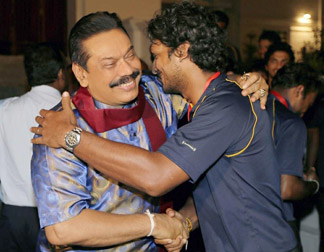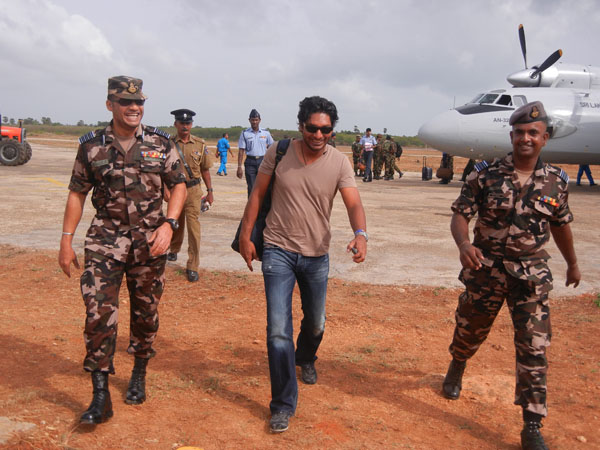Sri Lankan President Maithripala Sirisena has offered cricketer Kumar Sangakkara the post of High Commissioner to the United Kingdom, after the batsman concluded his final test match on Monday.
Mr Sangakkara, a cricketer from the south of the island, had been widely tipped to go into politics, following his retirement. He said he respected the offer but has not yet accepted the role.
The offer was reportedly made after former UNP parliamentarian Rosy Senanayake confirmed that she rejected offers to take up the post last week.
Mr Sangakkara, who the president called "a great honour to Sri Lanka", was widely hailed for his 2011 Cowdrey lecture at Lord's in London, igniting rumours that he may enter politics after his sporting career. In his speech, the cricketer spoke out against Sri Lankan cricket administrators, whom he accused of losing “accountability and transparency in administration and credibility of conduct”.
He went on to suggest the solution in tackling the sport's mismanagement may lie in international cricketing authorities “taking a stand to suspend member boards with any direct detrimental political interference and allegations of corruption and mismanagement”.
Whilst his criticism of the cricketing administration drew appreciation from abroad, the call for international intervention sparked an investigation by the Sri Lankan sports minister.
Despite the investigation, no further action was taken.
Instead, the speech was quickly applauded by the Sri Lankan government. Sri Lanka's president at the time Mahinda Rajapaksa, commended the speech, not for its criticism of the politicisation of sport on the island but for his take on the island's long-running ethnic conflict.
Now a recently elected member of parliament, Mr Rajapaksa commented that whilst the batsman “can express his views” about cricket, his portrayal of the island's ethnic troubles was accurate.
“About the country, he has said it,” said the former president, adding,
The batsman's praise of the military is not new, with Sri Lankan Air Force also having stated that Mr Sangakkara said he was “in debt to the Sri Lanka Armed Forces for the sacrifices made in bringing about a bright future for the country and that on every possible occasion they will remember these sacrifices”.
He went on to add,
The cricketer's comments have led to criticism, including from the former chief cricket writer for Australia’s The Age newspaper Trevor Grant, who slammed his attempts to depict Sri Lanka as a "haven of peace and tranquility".
"The Tamils in North-East Sri Lanka remain under the boot of the Sri Lankan Army," said Mr Grant.
See related articles:
Sangakkara: here to play cricket representing SL and franchise (01 Apr 2013)
Sangakkara’s role in whitewashing Sri Lanka (28 Dec 2012)
A force for good or ill? Cricket and Sri Lanka today (08 Jul 2011)
Desmond Tutu: Sports boycott crucial to ending apartheid (04 Apr 2011)
Mr Sangakkara, a cricketer from the south of the island, had been widely tipped to go into politics, following his retirement. He said he respected the offer but has not yet accepted the role.
The offer was reportedly made after former UNP parliamentarian Rosy Senanayake confirmed that she rejected offers to take up the post last week.
Mr Sangakkara, who the president called "a great honour to Sri Lanka", was widely hailed for his 2011 Cowdrey lecture at Lord's in London, igniting rumours that he may enter politics after his sporting career. In his speech, the cricketer spoke out against Sri Lankan cricket administrators, whom he accused of losing “accountability and transparency in administration and credibility of conduct”.
He went on to suggest the solution in tackling the sport's mismanagement may lie in international cricketing authorities “taking a stand to suspend member boards with any direct detrimental political interference and allegations of corruption and mismanagement”.
Whilst his criticism of the cricketing administration drew appreciation from abroad, the call for international intervention sparked an investigation by the Sri Lankan sports minister.
 Kumar Sangakkara embraces former Sri Lankan president Mahinda Rajapaksa. Photograph: Daily News |
Instead, the speech was quickly applauded by the Sri Lankan government. Sri Lanka's president at the time Mahinda Rajapaksa, commended the speech, not for its criticism of the politicisation of sport on the island but for his take on the island's long-running ethnic conflict.
Now a recently elected member of parliament, Mr Rajapaksa commented that whilst the batsman “can express his views” about cricket, his portrayal of the island's ethnic troubles was accurate.
“About the country, he has said it,” said the former president, adding,
“Now, no one has taken that part of it where he criticised the LTTE as terrorists. He spoke about the terrorists of Sri Lanka whereas some locals are trying to show the LTTE as our freedom-fighters!“During his speech Mr Sangakkara touched on the armed conflict involving the "terrorist LTTE" and his hopes for reconciliation. As noted by the Tamil Youth Organisation at the time though:
"Regrettably, in his lecture Sangakkara avoided mention of the war crimes and crimes against humanity committed by the present Sri Lankan regime in 2009. The intentional killing of over 40,000 Tamil civilians in five months is an inescapable reality that must be faced, particularly when such mass atrocities are inflicted by a state on its own citizens. In amidst such silence, any notion of reconciliation is hollow."The batsman also received praise from Sri Lanka's former defence secretary, and the former president's brother, Gotabhaya Rajapaksa.
“I can’t recall any sporting personality throwing his or her weight behind the military before such an audience under similar circumstances," he said.The cricketer has been known to work closely with the Sri Lankan military. Speaking at the conclusion of a project to donate bicycles to Kilinochchi, Mr Sangakkara praised the military for their role in the Tamil North-East.
“To have the army handle things so efficiently and to see them play such a large, pivotal role in changing children's' lives in the North and East, was again a sight that was so encouraging for everyone who was on that trip,” he said.
 Kumar Sangakkara with members of the Sri Lankan Air Force in 2011. |
The batsman's praise of the military is not new, with Sri Lankan Air Force also having stated that Mr Sangakkara said he was “in debt to the Sri Lanka Armed Forces for the sacrifices made in bringing about a bright future for the country and that on every possible occasion they will remember these sacrifices”.
He went on to add,
“The military and their new role is I think benefiting the citizens of those areas immensely. They appreciate the guidance, their understanding and their social initiatives immensely. And it has made our access into those areas, again with our social service programs, so much easier.”The Tamil people though, feel very differently. Protests across the North-East this year have repeatedly called for the removal of the military from Tamil areas. The Sri Lankan military, currently the subject of a United Nations report investigating the deaths of tens of thousands of Tamil civilians during the final weeks of the armed conflict, are also accused of committing ongoing human rights abuses. A series of reports, including two in the last month, outline ongoing torture and detention that Tamil civilians face at the hands of the military. Earlier this year the Chief Minister of the Northern Province told a senior British minister that the removal of the military was the most important issue facing the North-East.
The cricketer's comments have led to criticism, including from the former chief cricket writer for Australia’s The Age newspaper Trevor Grant, who slammed his attempts to depict Sri Lanka as a "haven of peace and tranquility".
"The Tamils in North-East Sri Lanka remain under the boot of the Sri Lankan Army," said Mr Grant.
See related articles:
Sangakkara: here to play cricket representing SL and franchise (01 Apr 2013)
Sangakkara’s role in whitewashing Sri Lanka (28 Dec 2012)
A force for good or ill? Cricket and Sri Lanka today (08 Jul 2011)
Desmond Tutu: Sports boycott crucial to ending apartheid (04 Apr 2011)
